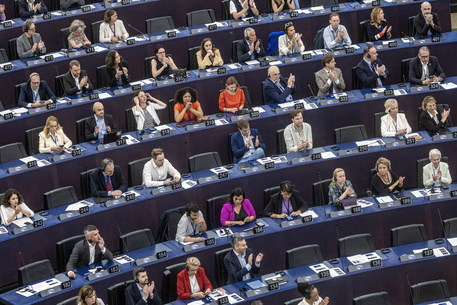(ANSA) - ROME, JUL 17 - The European Parliament is holding
its first plenary session since the European elections in June
this week. Newly-formed far-right groups are taking the stage
and MEPs from the 27 EU member states are reshaping the
720-member institution for the next five-year legislative term.
Radioactive.
The European Parliament convenes this week for the first time
since the June elections, with a bolstered far-right demanding
more influence in the 720-member assembly.
On Tuesday, the 45-year-old Maltese conservative Roberta Metsola
was re-elected as President of the European Parliament for a
two-and-a-half-year term. After her mandate, a socialist will
succeed her for the same duration.
The election result in June was characterised by a shift to the
right in the European Union and the striking reorganisation of
far-right groups in the parliament in the aftermath.
The far-right made significant gains in the June elections,
although the centrist coalition made up of the conservative
European People's Party (EPP), the centre-left Socialists and
Democrats (S&D) and the liberal Renew is still the largest with
each holding 188, 136 and 77 seats respectively.
Two newly established far-right groups entered the Parliament's
halls on Tuesday: the Patriots for Europe (PfE) - created by
Hungarian Prime Minister Viktor Orbán - and Europe of Sovereign
Nations (ESN) - a smaller camp that includes the Alternative for
Germany (AfD) and France's Reconquête. These two groups are seen
as politically radioactive.
With 84 MEPs from twelve countries - led by French Rassemblement
National (RN) chief Jordan Bardella - the PfE group is now the
third-largest force in the European Parliament, followed by the
European Conservatives and Reformists (ECR) with 78 seats.
The ESN group - created by the far-right AfD - brings together
25 MEPs from eight countries. It has two co-presidents, René
Aust from the AfD and Stanisław Tyszka from the Polish far-right
populist alliance Konfederacja (Confederation).
Patriots for Europe group accused of serving Russia.
The far-right PfE and ESN groups are a red line for the centrist
coalition (EPP, S&D and Renew). European Commission President
Ursula von der Leyen - who will undergo a vote in Parliament for
a second term on Thursday - said that there will be no dialogue
with them. EPP leader Manfred Weber said that "whoever is
against the EU cannot represent it".
Patriots spokesperson Alonso de Mendoza argued that a "cordon
sanitaire" - a strategy employed by mainstream political parties
to block the far-right - was "undemocratic".
The creation of the PfE group was announced at the end of June
by the leader of the Freedom Party of Austria (FPÖ) Herbert
Kickl, Hungary's Prime Minister Viktor Orbán (Fidesz) and former
Czech Prime Minister Andrej Babiš of the populist ANO party.
In Austria, representatives from other parties in the European
Parliament think little of the new group. In a press release,
the delegation leader of the Austrian People's Party (ÖVP),
Reinhold Lopatka, called them "the accomplices of the warmonger
Putin in Europe" and does not expect them to do productive work
in the Parliament.
"The self-proclaimed patriots for Europe are not interested in
the further development of the EU, but solely in its weakening,"
said Lopatka.
In the Czech Republic, Prime Minister Petr Fiala said on X that
the PfE group is knowingly or unknowingly serving Russia's
interests and thus threatening the security and freedom of
Europe. Babiš dismissed the comments and said that ANO has never
colluded with the Kremlin.
In response to Fiala's remarks, ANO representatives did not
attend a meeting of Czech MEPs with the prime minister last
Friday.
Former Portuguese ambassador and now MEP for the Portuguese
right-wing populist Chega party, António Tânger Corrêa, has
previously said that he was in favour of a solution to the
conflict in Ukraine that made Russia comfortable. Later he
changed his position, after backlash from some members of his
party, saying that Ukraine should be the one setting the terms.
(continues).
(The content is based on news by agencies participating in the
enr, in this case AFP, ANSA, APA, Belga, CTK, dpa, EFE, Lusa,
PAP, STA, Tanjug, TASR). (ANSA).
EU Parliament convenes as new far-right groups enter halls
First plenary session since June's European elections
